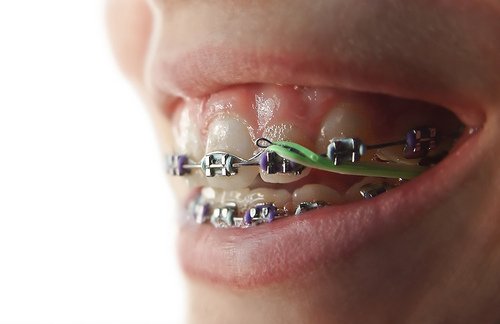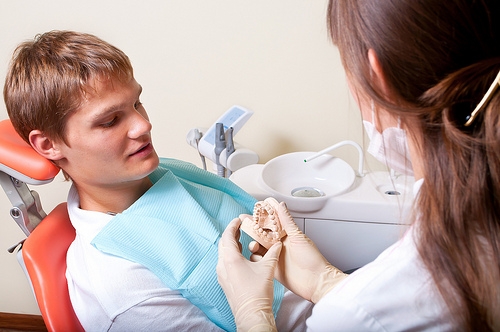February 16th, 2016

Most of our patients at Alta View Orthodontics will need to wear rubber bands at some point during their orthodontic treatment. The main reason our patients are instructed to wear rubber bands is to correct their bite. If your teeth do not fit together properly, Dr. Tony Skanchy will recommend that rubber bands be used. Dr. Tony Skanchy may also recommend using rubber bands to close or open spaces.
Rubber bands are a critical part of your treatment, and wearing them as Dr. Tony Skanchy and our team recommend will help move your teeth into the desired position. Dr. Tony Skanchy may ask you to wear your rubber bands full time, meaning that they should only be taken out when you brush and floss your teeth three times a day. Other times, you may be asked to only wear them part-time, like only during the day or only during sleep.
If you still have any questions about orthodontic rubber bands, we invite you to give us a call or ask us during your next adjustment appointment. Remember, wearing rubber bands as prescribed by Dr. Tony Skanchy is an important step during your treatment, and can reduce the time you have your braces. If you lose your rubber bands or run out, stop by our Sandy, UT office and pick up more!
February 9th, 2016

Two-phase orthodontic treatment involves two separate and distinct periods that your child receives orthodontic treatment. It allows your son or daughter to begin early treatment of bite and jaw problems, in order to reduce the dental issues he or she experiences later on.
Two-phase orthodontic treatment with Dr. Tony Skanchy can improve how well the second phase of the treatment works and helps to make room for permanent teeth. Overall, two-phase treatment helps to position the teeth and the jaw for an attractive profile. Our team at Alta View Orthodontics recommends that you bring your child to our Sandy, UT office at the age of seven or eight, so that Dr. Tony Skanchy can determine if early (Phase-One) treatment is necessary.
Phase-One
Phase-One orthodontic treatment is known as early treatment. It begins shortly after your child’s first orthodontic examination, usually around age eight or nine. The main goal of Phase-One orthodontic treatment is to help make room for permanent teeth, which reduces crooked teeth as a result of overcrowding. It treats the jaw and bite growth, and issues like crossbite or underbite. This can reduce the need for your child to undergo extractions.
Phase-Two
Phase-Two orthodontic treatment is when braces are placed on the upper and/or lower teeth. The purpose is not just to correct spaces or misaligned teeth, but also to correct overbite or underbite concerns. Phase-Two usually begins around age 11 or 12, and the braces are worn for an average of two to three years, depending on your child’s unique needs. Some children have fewer issues and wear braces for little more than a year, while others need them for up to four years.
Signs your child needs two-phase orthodontic treatment
If your child exhibits the following signs, he or she may be a good candidate for two-phase orthodontic treatment:
- Losing baby teeth early, before five years of age
- Problems with biting or chewing
- Sucking the thumb after age five
- Evidence of a crossbite, where the teeth don’t come together when opening or closing of the mouth
- Teeth are crowded at age seven or eight
- Protruding teeth on the top or bottom
Not all children need to have early treatment, but if your child shows any of these signs, you should bring him or her to us for an evaluation at Alta View Orthodontics.
February 2nd, 2016

Orthodontics researchers continue to innovate and develop the best ways to improve patients’ smiles. The latest generation of orthodontics includes Damon Smile, an advanced form of braces that improve upon the metal brackets of earlier generations. Talking to Dr. Tony Skanchy can help you decide if Damon Smile braces are appropriate for your orthodontic needs.
What are Damon Smile braces?
Traditional braces require a series of brackets to be bonded to each tooth. Then, a thin metal wire connects the brackets. These wires are immovable and are firmly connected to the brackets. With Damon Smile, a special “invisible” bracket is placed on the teeth. Unlike with traditional braces, wires pass through these brackets but can slide within the bracket. This reduces friction and may result in a more comfortable process than traditional braces.
Aesthetic Considerations
Both teens and adults often hate the look of traditional braces, with their clunky metal brackets and wires. Additionally, rubber bands may need to be worn to hold brackets closed. With Damon Smile braces, none of these concerns apply. The brackets are clear and no rubber bands are needed, meaning that few people will notice your orthodontics unless they look closely.
Differences in Cost
Traditional braces tend to be the most cost effective orthodontic option available. Because of their specialized equipment, Damon Smile braces do cost more than traditional alternatives. It’s worth checking with your insurance company to determine whether both types of orthodontics are covered.
Length of Treatment
Another benefit of Damon Smile braces is a decreased length of treatment. Compared to traditional braces, individuals who opt for Damon Smile braces typically experience significantly lower treatment time. Particularly for those with complex orthodontic problems, shaving even a few months off of treatment may be worth it.
Less Irritation of Gums
Some people report that they experience sores or gum pain after implementation of traditional braces. Damon Smile braces are specially formed to be smooth and less invasive. This may result in diminished pain and a lower rate of gum problems. The differences are particularly noticeable in the first weeks of treatment.
To find out if Damon Smile braces can meet your smile needs, contact our Sandy, UT office and schedule an appointment!
January 26th, 2016

How You Can Start Preparing Now
When you first start thinking about going to the orthodontist, it is normal to feel apprehensive. What will your orthodontic experience bring? Whether you have been advised by a dentist or chosen to seek out orthodontic care from Dr. Tony Skanchy on your own, there are a few things you can do to prepare for your initial consultation at Alta View Orthodontics.
One of the best ways to prepare for an orthodontic consultation is to understand your options. With so many choices available today, orthodontic care is a lot more versatile than in the past. You can start preparing now by seeking out and understanding those options. With a few specific things in mind, you can be totally confident and prepared for your consultation.
Questions to Ask During the Consultation
As you consider orthodontic care, it is likely that a few questions may naturally arise. Don’t be afraid to ask any questions you might have. Our orthodontic team is here to help. Here are just a few examples of questions you may want to ask at your consultation.
- Is there an estimated length of time that I will likely require braces?
- How much should I expect to pay for my treatment? What are the payment options?
- Does getting braces hurt? Is there anything I can do to prevent or minimize pain?
- Is it likely that I will be wearing extra appliances in addition to braces to correct my overbite or other problems?
- Are there specific foods I will need to avoid when I get braces?
- Will braces prevent me from playing my favorite sport or musical instrument?
- How can I keep my teeth clean with braces?
- How often will I be expected to come in for checkups and other appointments?
Once your consultation is over, you don’t have to feel like your options are exhausted. If questions arise after the consultation, don’t be afraid to ask. Our orthodontic team will be here to help throughout the entire process.
Confidence throughout the Process
With answers to your questions, and an orthodontic team on your side, you can be confident about any necessary orthodontic treatments. From the initial consultation to the day your braces come off, your orthodontic treatment at Alta View Orthodontics can be a smooth and simple process. The moment you see that beautiful smile, you’ll know it was all worth it.
We love bringing nothing but the most amazing smiles to our patients!






 Website Powered by Sesame 24-7™
Website Powered by Sesame 24-7™